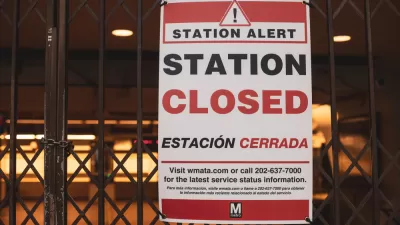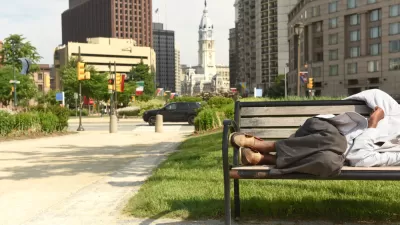For the second year in a row, Washington D.C. is ending its fiscal year in the black, raising hopes that prior cuts to city services can be reversed. So why are city leaders planning to bulk up the city's savings instead?
As we've heard before, with low unemployment, ongoing redevelopment, and its population growing, D.C. has done quite well for itself during the recent recession. Now, "[t]hanks to the hefty incomes of D.C.
newcomers, the timely passing of a few wealthy residents, and thousands
upon thousands of speeding-camera tickets," the city is looking at a $140 million operating surplus as its fiscal year ends, reports Mike DeBonis.
"The new windfall has renewed calls to relieve the impact of prior
cuts," says DeBonis. "D.C. Council member Jim Graham (D-Ward 1) said the surplus could
fund a list of 29 now-unfunded line items [from homeless services to housing assistance] in the 2013 budget that goes into effect Monday."
However, despite the surplus, the fear of severe federal government cuts due to the coming "fiscal cliff" has the city's top financial officer refusing to raise his revenue estimates. According to DeBonis, "both [Mayor] Gray and Council Chairman Phil Mendelson
(D) said the money will remain in the bank, in keeping with a recent law
intended to bulk up the city's savings."
FULL STORY: D.C. officials estimate $140 million operating surplus as fiscal year draws to close

Alabama: Trump Terminates Settlements for Black Communities Harmed By Raw Sewage
Trump deemed the landmark civil rights agreement “illegal DEI and environmental justice policy.”

Study: Maui’s Plan to Convert Vacation Rentals to Long-Term Housing Could Cause Nearly $1 Billion Economic Loss
The plan would reduce visitor accommodation by 25% resulting in 1,900 jobs lost.

Planetizen Federal Action Tracker
A weekly monitor of how Trump’s orders and actions are impacting planners and planning in America.

Wind Energy on the Rise Despite Federal Policy Reversal
The Trump administration is revoking federal support for renewable energy, but demand for new projects continues unabated.

Passengers Flock to Caltrain After Electrification
The new electric trains are running faster and more reliably, leading to strong ridership growth on the Bay Area rail system.

Texas Churches Rally Behind ‘Yes in God’s Back Yard’ Legislation
Religious leaders want the state to reduce zoning regulations to streamline leasing church-owned land to housing developers.
Urban Design for Planners 1: Software Tools
This six-course series explores essential urban design concepts using open source software and equips planners with the tools they need to participate fully in the urban design process.
Planning for Universal Design
Learn the tools for implementing Universal Design in planning regulations.
Caltrans
Smith Gee Studio
Institute for Housing and Urban Development Studies (IHS)
City of Grandview
Harvard GSD Executive Education
Toledo-Lucas County Plan Commissions
Salt Lake City
NYU Wagner Graduate School of Public Service





























